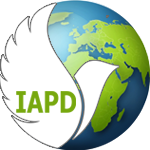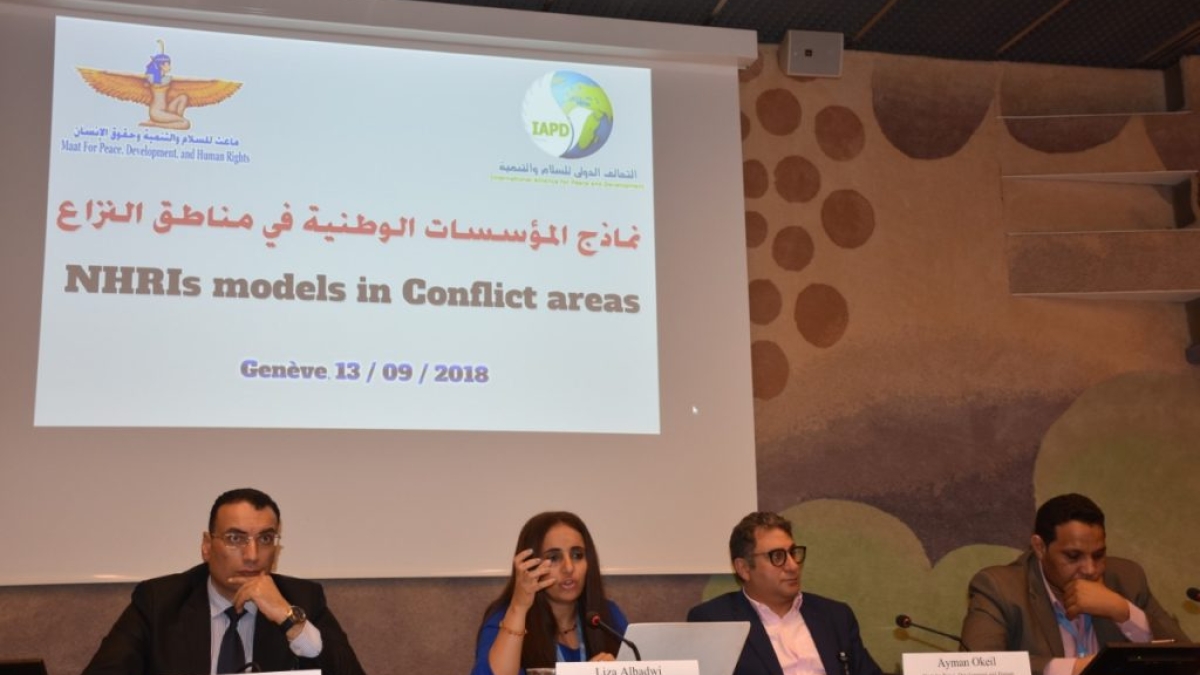At the United Nations headquarters in Geneva, on the sidelines of the 39th Session of the Human Rights Council: Maat Association and the International Alliance discuss the role of National Institutions in conflict areas
Okeil: politicization is the biggest challenge facing the work of National Institutions.
Al- Badwi: Report of the Panel of Experts on Yemen has serious inaccuracies. As well, Yemeni Activists emphasize: the mechanisms of the UN in Yemen failed.
Okeil: politicization is the biggest challenge facing the work of National Institutions.
Al- Badwi: Report of the Panel of Experts on Yemen has serious inaccuracies. As well, Yemeni Activists emphasize: the mechanisms of the UN in Yemen failed.
On the sidelines of Maat’s participation in the 39th session of the HRC in Geneva, the Maat for Peace, Development and Human Rights and the International Alliance for Peace and Development held a side event at the United Nations Headquarters in Geneva. The side event entitled “Arab National Human Rights Institutions with a Focus on Conflict Areas” on Thursday, September 13, 2018. The event was attended by a large presence of human rights experts and activists, officials and media participants in the 39 session of the Council, which was launched earlier this week.
The side event focused on the situation of national human rights institutions in the Arab region, and presented an evaluation vision for their roles during the current and the next phases. Also, the event paid a special attention to the national institutions in areas of armed conflict such as Yemen, Libya and Syria. That’s in an attempt to determine their roles in bridging the gap between the conflicting parties, monitoring the human rights situations in the war, promoting an interactive dialogue, embracing peace options and to lead the process of reconciliation and equity in the post-conflict phase.
During his speech, Ayman Okeil, General Director of Maat Association and the Coordinator of the International Alliance for Peace and Development, pointed out that the most important challenge facing the national institutions in the Arab region, is politicizing their work and adopting the political orientations of some regimes. While, these political interests and views are clearly violating the fundamental principles of the human rights and intensifying non-objective and unethical actions. Thus, these institutions direct all its efforts to attack the human rights situations in some countries, on the one hand, and they have a lack of real interest in assisting victims of violations, on the other hand.
Concerning the states of conflict, Okeil stressed that National Institutions should play a role in solving the human rights problems in these societies. They can play an active role in promoting peace and encouraging efforts to stop war, and returning to the dialogue. Hence, they can support the transitional justice and reconciliation processes that following the end of the conflict. He also stated that many international experiences and human rights practices in societies that have witnessed political and military conflicts prove that the existence of a national institution during a conflict may foster dialogue between moderates and create some kind of control over abuses by either party to the conflict.
Dr. Ayman Fouad, a human rights expert and former advisor to the National Council for Human Rights in Egypt, spoke about the frameworks that governing the national institutions and their activation on the ground. As well, He pointed out that regardless of the legal structure of the national institution, the ruling point is the extent of its compliance with the Paris principles. So, He referred to some good examples and experiences in the Arab region, such as the Moroccan, Tunisian and Egyptian experience.
Moreover, Dr. Walaa Jad Al-Karim, Chairman of Partners for Transparency, presented a comparable vision among national human rights institutions in the Arab region, in which he focused on the availability of standards of independence and pluralism in these institutions. He also said that countries such as Egypt, Tunisia and Morocco have a pluralistic framework, due to the existence of Political parties, trade unions and elected parliaments. This pluralism reflected in the independence and pluralism of the formation of their national institutions. While, the corresponding institutions in some Gulf countries were born in societies without pluralism, and have nothing with the trade unions and civil society. Also, in those gulf countries, there is no free elected parliament to appoint members of the National Institutions, thus, the institutions have turned into a mere acoustic phenomenon and a hollow echo of some ruling regimes.
The legal expert, Lisa Al-Badwi, gave an assessment of the status of the national institution in Yemen. She focused on the negative impact of the weakness of the national institution on the role played by some of the UN mechanisms in Yemen. Also, she pointed out that there is a lack of coordination between the UN mechanisms in Yemen in general, and a lack of a minimum level of methodology in many of the UN human rights bodies. She was evidenced by the report of the High Commissioner of Human Rights Council. This report was on the report of the Committee of Experts on the Situation of Human Rights in Yemen, which included serious systematic fallacies resulting from the lack of communication with all actors.
The report of the High Commissioner was faced with wide objections from experts and the participated activists. As, the interventions revealed that there was a broad rejection of the report in the human rights circles. The interventions also focused on “the Committee’s exceeding its mandate and Specializations”. It was a formed committee under item 10 on technical support. It has no authority, no means and no abilities to investigate, monitor and document facts, so, it has been involved in wrong and misleading information.
Nevertheless, the participators in the side event demanded that the mandate of the Panel of experts in Yemen should not be extended, since it didn’t play any concrete and effective role on the ground. That panel, along with other United Nations human rights mechanisms concerned with Yemen, obtained information from sources close to the armed militias. As well as, they adopt the view of the parties benefiting from the existence of the Iranian-backed militias. The UN rights-related product of Yemen often ignores this central point in understanding the human rights impact of the conflict, and draws un-objective and illogical criticism of the Arab Coalition which based on international legitimacy resolutions.










